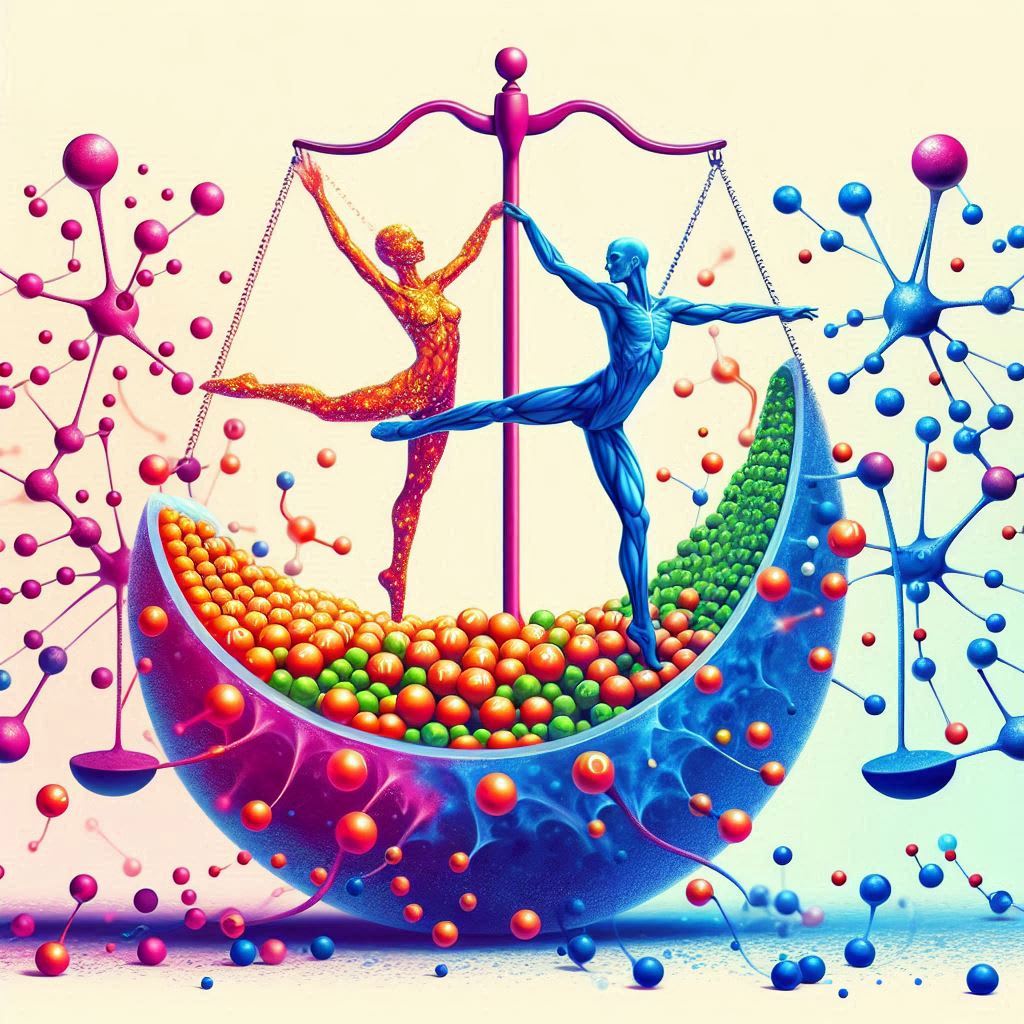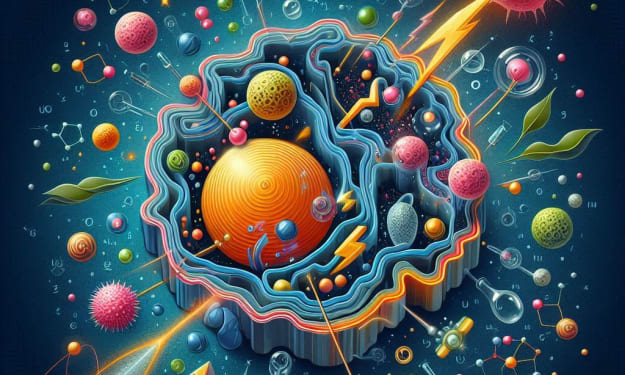The Sodium Shuffle: Unlocking the Secrets of Electrolyte Harmony
Dive into the Dance of Sodium in Your Body and Discover How to Maintain Balance for Optimal Health

The Sodium Shuffle: Mastering the Dance of Electrolytes in Your Body
Imagine a bustling city - your bloodstream - teeming with tiny citizens: sodium ions (Na+). These miniature movers and shakers play a vital role in your health, orchestrating a delicate dance within your body. But like any well-coordinated performance, maintaining the proper sodium balance is crucial. Let's delve into the fascinating world of sodium, exploring its functions, how your body keeps it in check, and the consequences when things go awry.
Why Sodium Matters: More Than Just Flavor
While sodium is often associated with table salt (NaCl), its impact goes far beyond enhancing your food's taste. Here's why this mineral is a hidden hero in your body:
- Maintaining Cellular Harmony: Sodium plays a critical role in generating electrical signals across cell membranes. This electrical dance is essential for muscle function, nerve impulses, and even brain activity.
- Regulating Fluid Balance: Sodium acts as a magnet for water. The amount of sodium in your bloodstream directly affects how much water your body retains. This delicate balance ensures optimal blood pressure and prevents dehydration.
- Keeping Your Cells Happy: Sodium helps maintain the proper volume and pressure within your cells, crucial for their normal function.
The Sodium Balancing Act: A Delicate Ecosystem
Your body has a sophisticated system for meticulously regulating sodium levels. Here's a breakdown of the key players:
- Dietary Intake: The amount of sodium you consume is the starting point. Most of your sodium comes from processed foods and table salt.
- Renal Excretion: Your kidneys are the masterminds behind sodium balance. They meticulously filter your blood, reabsorbing most of the sodium and excreting the excess in your urine. The amount of sodium reabsorbed depends on factors like your hydration status and blood pressure.
- Hormonal Orchestra: Several hormones play a role in the sodium symphony. Aldosterone, released by your adrenal glands, encourages sodium reabsorption in the kidneys. Conversely, hormones like atrial natriuretic peptide (ANP) and brain natriuretic peptide (BNP) work to increase sodium excretion when blood volume gets too high.
Ready to Test Your Sodium Savvy? The Sodium Shuffle Challenge!
Think you've grasped the importance of sodium balance? Grab a pen and put your knowledge to the test with this quick quiz:
Question 1: Salty Scenario
You're out for a long run on a scorching summer day. Sweating profusely, you reach for a refreshing sports drink. However, the label indicates it's high in sodium.
What's the potential consequence of consuming this drink after your run?
a) Increased risk of dehydration (incorrect answer)
b) Lowered blood pressure (incorrect answer)
c) Higher risk of muscle cramps (correct answer)
d) Reduced nerve impulses (incorrect answer)
Explanation: While the drink might replenish electrolytes lost through sweat, the high sodium content could further deplete your body's water stores, potentially leading to muscle cramps. Opt for water or a low-sodium sports drink after exercise.
Question 2: Mystery of the Missing Minerals
You've been feeling sluggish lately, experiencing headaches and fatigue. You suspect an electrolyte imbalance might be the culprit. Your doctor confirms low sodium levels.
What could be a contributing factor to your hyponatremia (low sodium)?
a) Excessive salt intake (incorrect answer)
b) Prolonged vomiting or diarrhea (correct answer)
c) Overuse of diuretics (correct answer)
d) All of the above (correct answer)
Explanation: While excessive salt intake can contribute to high blood pressure, it's unlikely to cause hyponatremia. Conditions that lead to excessive fluid loss, like vomiting, diarrhea, or taking diuretics, can deplete sodium levels.
Question 3: The Hydration Equation
You're planning a camping trip and want to ensure proper hydration. You know water is key, but have also heard about the importance of electrolytes.
How can you maintain a healthy balance between water and sodium intake during your adventure?
a) Consume only water and rely on natural electrolytes in food (potentially risky)
b) Pack electrolyte tablets and drink plenty of water (correct answer)
c) Limit water intake and consume salty snacks (incorrect answer)
d) Alternate between water and sugary drinks (incorrect answer)
Explanation: While some food sources provide electrolytes, relying solely on them during physical activity might not be enough. Electrolyte tablets dissolved in water can be a convenient way to maintain a balanced intake.
Bonus Question: The Sodium Savvy Shopper
You're at the grocery store, overwhelmed by the variety of packaged foods. How can you be a sodium-savvy shopper?
What's the best approach to decipher the sodium content on food labels?
a) Focus solely on the number of grams of sodium listed (not ideal)
b) Compare the "% Daily Value (DV) for Sodium" and aim for lower percentages (correct answer)
c) Look for labels mentioning "low-sodium" or "sodium-free" (helpful, but not foolproof)
d) Avoid all processed foods altogether (unnecessary restriction)
Explanation: While checking for terms like "low-sodium" can be helpful, the "% Daily Value (DV) for Sodium" provides a more standardized comparison between different food products. Aim for options with a lower DV percentage.
Congratulations!
By answering these questions, you've demonstrated a solid understanding of sodium balance. Remember, maintaining a healthy sodium level is crucial for optimal health. Keep these tips in mind and strive for a balanced approach!
When the Harmony Falters: Consequences of Sodium Imbalance
While your body strives for sodium balance, imbalances can occur. Let's explore the two main scenarios and their implications:
- Hyponatremia (Low Sodium): When sodium levels dip too low, water rushes into your cells to maintain balance. This swelling, particularly in the brain, can lead to headaches, confusion, seizures, and even coma in severe cases. Causes of hyponatremia include excessive water intake, excessive fluid loss (diarrhea, vomiting), or certain medications.
- Hypernatraemia (High Sodium): When sodium levels become excessively high, water is drawn out of your cells, leading to dehydration. This can cause symptoms like thirst, fatigue, confusion, and even seizures in severe cases. Dehydration due to insufficient water intake and excessive sweating are common causes.
Maintaining Sodium Balance: Practical Tips for a Healthy You
Knowing the importance of sodium balance, here are some practical tips to keep your sodium levels in check:
- Limit Processed Foods: Most processed foods are loaded with sodium. Opt for fresh fruits, vegetables, and whole grains.
- Embrace Flavorful Alternatives: Explore herbs, spices, and citrus to add zest to your food instead of relying solely on salt.
- Read Food Labels: Be mindful of the sodium content in packaged foods and choose lower-sodium options whenever possible.
- Stay Hydrated: Aim for adequate water intake throughout the day to help your kidneys efficiently regulate sodium levels.
- Talk to Your Doctor: If you have concerns about your sodium levels or are at risk of imbalances due to health conditions or medications, consult your doctor for personalized advice.
The Future of Sodium Research: Beyond Balance
The story of sodium doesn't end here. Researchers are actively exploring the potential connection between sodium intake and chronic conditions like heart disease and high blood pressure. Additionally, the impact of sodium balance on cognitive function and Alzheimer's disease is an area of ongoing investigation.
By understanding the intricate dance of sodium within your body, you can take charge of your health and maintain a harmonious balance for optimal well-being. Remember, a balanced diet, adequate hydration, and consulting your doctor for personalized guidance are vital steps on the road to a healthy sodium level and a thriving body.
Disclaimer: This information is for educational purposes only and should not be interpreted as medical advice. Always consult a healthcare professional for diagnosis and treatment of sodium imbalances.
About the Creator
suren arju
Hi there! I'm Suren, your startup guide. Entrepreneur, writer, dreamer - I share insights, tips & stories to fuel your startup journey. Ready to explore, learn & win together? Join me & let's redefine how we launch, learn & leap!
Enjoyed the story? Support the Creator.
Subscribe for free to receive all their stories in your feed. You could also pledge your support or give them a one-off tip, letting them know you appreciate their work.





Comments
There are no comments for this story
Be the first to respond and start the conversation.